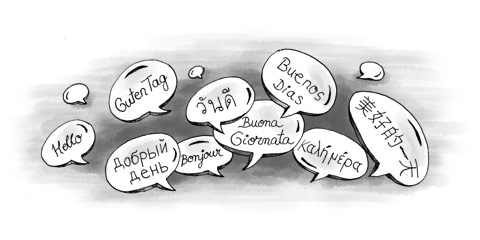Dutch in Belgium is virtually identical to Dutch in the Netherlands, with the exception of a few local terms and expressions, although certain areas in Dutch-speaking Belgium have local dialects that can sometimes be incomprehensible to speakers of standard Dutch.
Official languages
The French spoken in Belgium is standard but with its own distinctive accent (at least according to the French!) and a few specialised words, notably the use of septante and nonante for 70 and 90 instead of soixante-dix and quatre-vingt-dix. (Oddly, the Belgians do use quatre-vingt for the number 80 rather than huitante, which is used in Switzerland and some other francophone areas of the world.)
Almost 60 per cent of the Belgian population speak Dutch as their first language, 40 per cent are francophones and there is a small German speaking region (with less than 2 per cent of the population) in the eastern part of the country along the German border.
Linguistic divisions
Belgium is officially divided into linguistic regions, with Dutch the official language of the five northern and north-eastern provinces (Antwerp, East Flanders, Flemish Brabant, Limburg and West Flanders). French is the official language of the five Wallonian provinces in the south (Hainaut, Liège, Luxembourg, Namur and Walloon Brabant). The city of Brussels and its surrounding area are legally designated as a bilingual region, although individual towns may insist on asserting one language over the other, depending on the results of the latest local elections. Even the small German population is recognised as a distinct linguistic region under Belgian law.
Within each region, the majority of residents speak the designated language and most road signs, government services and public schooling are available only in the official regional language. Driving across Belgium can be particularly confusing, as most cities and towns have both a French and a Dutch name, which often bear little resemblance to each other, e.g. the city of Mons, in French, is Bergen in Dutch.
French is probably the ‘preferred’ language for the Brussels area on account of the concentration of international organisations (which are often heavily subsidised by the French government to encourage and insist upon ‘ la francophonie’!) and the preponderance of French-speaking residents who work in those organisations. On the other hand, there are far more jobs available (owing to the concentration of industry and commerce) in the Dutch part of the country.
A language for everyone
English is widely spoken in and around Brussels and Antwerp, and you’re likely to find more English speakers in the Dutch areas of Belgium than in Wallonia. Except for the highest level diplomatic appointments (where you’ll only need to be fluent in Diplomatese), you’ll be expected to have some knowledge of the appropriate regional language no matter what sort of job you’re applying for. Having both French and Dutch can be a major advantage in the job hunt as no more than 20 per cent of Belgians are bilingual in the two major national languages, and they’re more likely to live in Flanders than in Wallonia.
If looking to learn one or more of these languages ExpatLanguageSchool.net can help you with one-to-one language learning and support, all provided by certified native speakers. They currently offer tailored online language courses in Dutch, English, French, German, Swiss German, Italian, Spanish and Russian, all taught by skilled teachers, who know about the challenges you face as an expat and can customise your learning to your personal context and challenges.
This article is an extract from Living and Working in in Holland, Belgium & Luxembourg from Survival Books.



